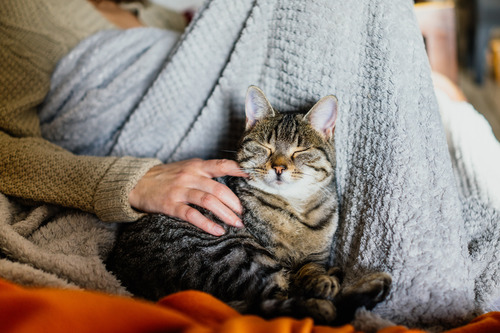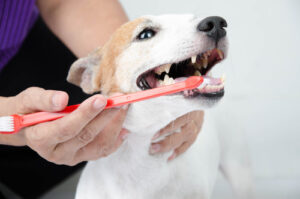Cats are more than just pets—they’re cherished members of our families who bring joy and companionship to our lives. But what happens when your usually energetic feline seems under the weather? If you’ve ever wondered, “Can cats get colds?” The answer is yes, and being aware of the signs and causes of cat colds can help you keep your furry friend feeling their best. At Pet Townsend Veterinary Clinic, we can help diagnose your cat’s cold and provide a treatment plan tailored to their individual needs. If you suspect your cat has a cold, call us at (360) 379-1133 to schedule an appointment.
What Causes Colds in Cats?
Colds in cats, also known as upper respiratory infections (URIs), are usually caused by viral infections. The two most common viruses responsible are the feline herpesvirus (FHV-1) and the feline calicivirus (FCV). Both of these viruses are highly contagious among cats and can spread through direct contact with an infected cat or by sharing food and water bowls, litter boxes, or bedding. Cats can also catch colds due to environmental factors, such as exposure to cold weather, poor ventilation, or stress. While these factors alone don’t cause the virus, they can weaken your cat’s immune system, making them more susceptible to infection. It’s also worth noting that cats who spend time in shelters, boarding facilities, or households with multiple cats are at a higher risk of contracting a cold.
Understanding Feline Herpesvirus (FHV-1)
Once a cat is infected with FHV-1, they become a carrier for life. This means that even if your cat appears healthy, stress or illness can reactivate the virus, leading to cold symptoms. FHV-1 typically causes sneezing, runny nose, and watery eyes. In severe cases, it can also lead to ulcers on the cornea, which requires prompt veterinary attention.
Feline Calicivirus (FCV) and Its Effects
FCV not only causes typical cold symptoms but can also lead to more severe issues, such as oral ulcers and lameness. Unlike FHV-1, cats infected with FCV can recover fully, but the virus can still persist in the environment, potentially infecting other cats.
What Are Some Symptoms of a Cat Cold?
Cats are known for their stoic nature, and they often hide their symptoms when they’re not feeling well. However, there are several signs that your cat might have a cold. The most common symptoms of a cat cold include:
- Sneezing
- Runny or congested nose
- Watery eyes
- Coughing
- Loss of appetite
- Lethargy
- Fever
In some cases, you might notice your cat breathing through their mouth due to nasal congestion. If your cat shows any of these symptoms, you should monitor their condition closely. While most cat colds resolve on their own within a week or two, more severe cases might require veterinary intervention, especially if your cat is very young, elderly, or has a compromised immune system.
When Should You Seek Veterinary Care?
While many cat colds are mild and resolve on their own, there are certain situations where you should seek veterinary care immediately. If your cat is not eating or drinking, has difficulty breathing, or if their symptoms persist for more than a week, it’s time to call (360) 379-1133 or request an appointment online with Pet Townsend Veterinary Clinic. Early intervention can make a significant difference in your cat’s recovery.
How Are Cat Colds Diagnosed?
If your cat is showing symptoms of a cold, it’s a good idea to contact Pet Townsend Veterinary Clinic. Our veterinarians can perform a thorough examination to determine the cause of your cat’s symptoms. Diagnosis typically involves reviewing your cat’s medical history, conducting a physical examination, and in some cases, performing tests such as blood work or nasal swabs to identify the specific virus. During the exam, your veterinarian will also check for any secondary bacterial infections, which can occur in conjunction with viral infections and may require antibiotics.
Can Cat Colds Be Prevented?
Preventing cat colds is not always possible, but there are steps you can take to reduce the risk.
- Vaccination is one of the most effective ways to protect your cat from the viruses that cause colds. The FVRCP vaccine, which is part of the core vaccination protocol for cats, protects against feline herpesvirus, calicivirus, and panleukopenia.
- Regular veterinary check-ups can ensure your cat’s vaccinations are up-to-date and that they are in good health.
- Providing a stress-free environment, particularly in multi-cat households, can help keep your cat’s immune system strong. This can include providing separate feeding areas, plenty of hiding spots, and interactive play to reduce tension.
- Maintaining a clean environment for your cats, such as ensuring your cat’s living area is well-ventilated and free from drafts, can help as well.
- If you have more than one cat, isolate the sick cat in a separate room with their own food, water, and litter box until they have fully recovered. Wash your hands thoroughly after handling the sick cat and before touching your other pets.
Caring for a Cat with a Cold
If your cat does catch a cold, there are ways you can help them feel more comfortable. While home care won’t cure the cold, it can ease your cat’s symptoms and support their recovery.
- Ensure your cat stays hydrated by providing fresh water and offering wet food, which is easier to eat when they have a sore throat or stuffy nose.
- You can also create a steamy environment by running a humidifier or bringing your cat into the bathroom while you take a hot shower. The steam can help loosen mucus and make breathing easier.
- Keep your cat warm and comfortable. Provide them with a cozy bed in a quiet area away from drafts.
- You might also need to clean their eyes and nose gently with a damp cloth to remove discharge.
- Never give your cat over-the-counter cold medications meant for humans, as these can be harmful to pets.
While colds in cats can be concerning, they are usually manageable with proper care and attention. Keeping your cat’s vaccinations up-to-date, providing a stress-free environment, and seeking veterinary care when needed can all contribute to their long-term health. If you have any concerns about your cat’s symptoms or overall well-being, contact Pet Townsend Veterinary Clinic at (360) 379-1133 or request an appointment online.





